Virtual reality is revolutionizing the way you dine by placing you in captivating environments that increase engagement and enjoyment. With interactive 3D menus, you can see meal options in real-time, leading to a more personalized and memorable dining experience. Virtual tours of kitchens and farms enhance your emotional attachment to food. This technology also fosters social interaction through gamification, making meals more interactive. As leading brands incorporate VR to merge digital and physical culinary experiences, the future holds the potential for even more sensorial dining adventures. Explore how these advancements can redefine your upcoming meal experiences.
Key Takeaways
- Virtual reality dining creates immersive experiences that enhance customer engagement and enjoyment while dining.
- Interactive 3D menus allow diners to visualize meal options in real-time, improving decision-making.
- VR training reduces onboarding time for staff by simulating realistic customer service scenarios.
- Personalized marketing through AR/VR tools fosters brand loyalty and enhances customer satisfaction.
- Future trends indicate a blend of digital and physical dining experiences, increasing sensory engagement.
Industry Growth and Trends
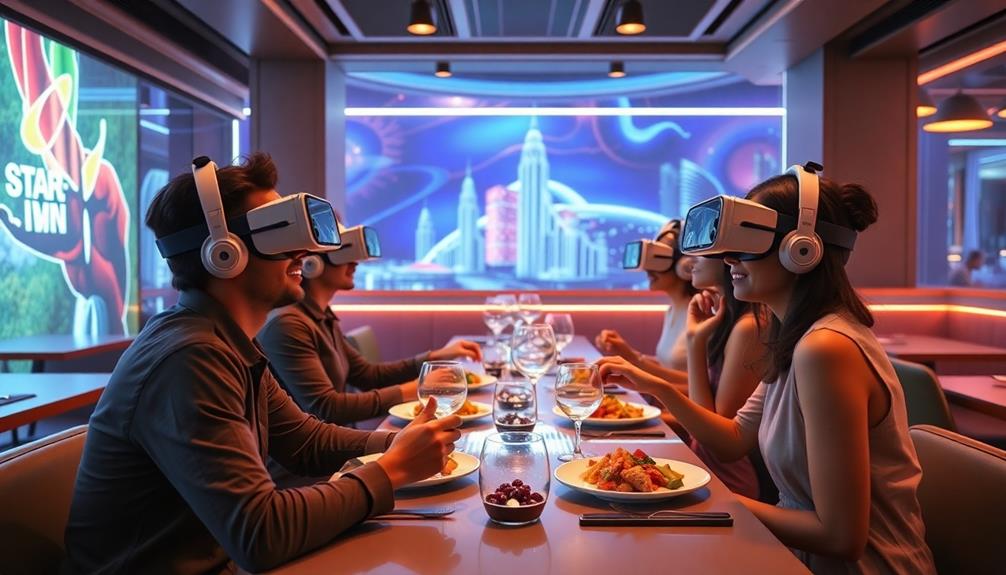
The AR/VR market is set to take off, with projections showing growth from $40.4 billion in 2024 to $62 billion by 2029. This surge highlights how AR/VR technology is transforming various sectors, particularly the food industry.
As you explore virtual reality dining, you'll discover innovative ways restaurants enhance customer engagement through immersive experiences. For example, virtual reality can transport diners to the origins of their meals, allowing them to experience the farm-to-table cooking ethos firsthand.
The demand for interactive dining experiences is on the rise, with virtual tours and immersive menus becoming essential. These innovations allow you to connect with your favorite eateries in ways that were previously unimaginable, making dining more of an adventure.
Personalized recommendations powered by AI tools can further tailor your experiences, ensuring you enjoy meals that suit your tastes and preferences.
As the food industry continues to adapt, you'll notice that these trends aren't just about novelty but also about building brand loyalty. By leveraging AR/VR technologies, businesses reveal new ways to engage customers, keeping them coming back for more.
With every bite, you'll be part of a dining revolution that prioritizes personalization and immersive experiences, setting the stage for a future where every meal is an unforgettable journey. This evolution in dining goes beyond just the food, incorporating elements like lighting, music, and decor to craft a complete sensory experience. The impact of ambiance on eating habits has become a key factor in shaping how diners perceive and enjoy their meals, influencing not only what they eat but also how much they consume. As these curated environments become the norm, the connection between surroundings and satisfaction continues to deepen, transforming every dining occasion into a thoughtfully designed event.
Enhanced Customer Experience
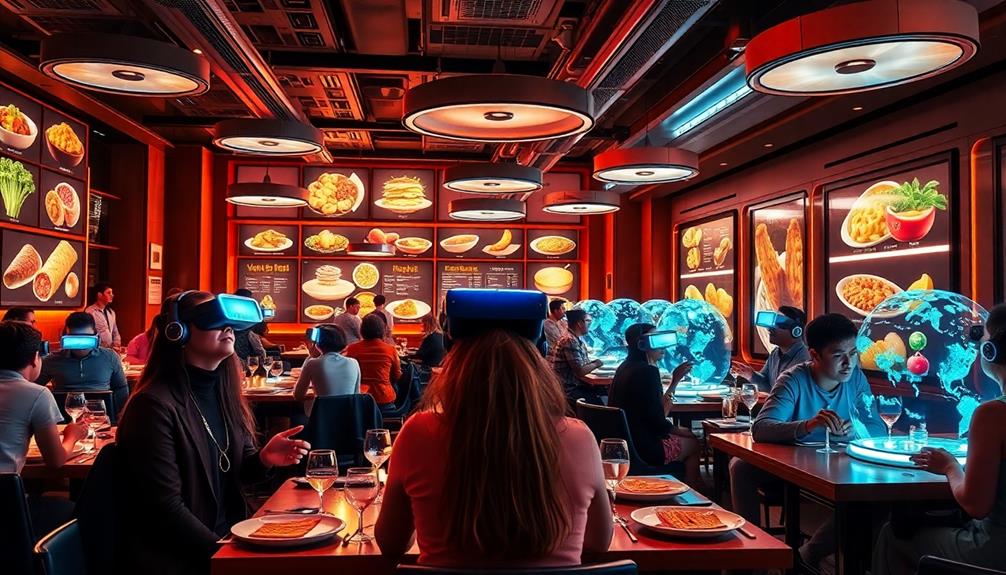
As restaurants embrace the potential of AR/VR technology, they're redefining how you experience dining. With virtual reality, your meal transforms into an immersive experience that can transport you to exotic locations or whimsical settings, enhancing the overall atmosphere and enjoyment of your dining experience.
Imagine sitting at your table while interactive 3D menus powered by VR allow you to visualize meal choices in real-time, such as the rich flavors of Red-Braised Pork Belly or the unique texture of Chicken Feet. This innovation greatly improves decision-making and boosts customer engagement as you explore your options.
Moreover, VR experiences can take you on virtual tours of kitchens or farms, revealing food origins and preparation processes. This insight fosters a deeper emotional connection to your meal, ultimately enhancing your satisfaction. Research shows that diners in VR settings report a heightened sense of enjoyment, making each bite feel more meaningful.
Additionally, restaurants can gamify dining through VR technology, offering interactive entertainment that keeps you engaged while waiting. This not only enhances your experience but also encourages sharing and social interaction with your companions.
Training and Operational Efficiency
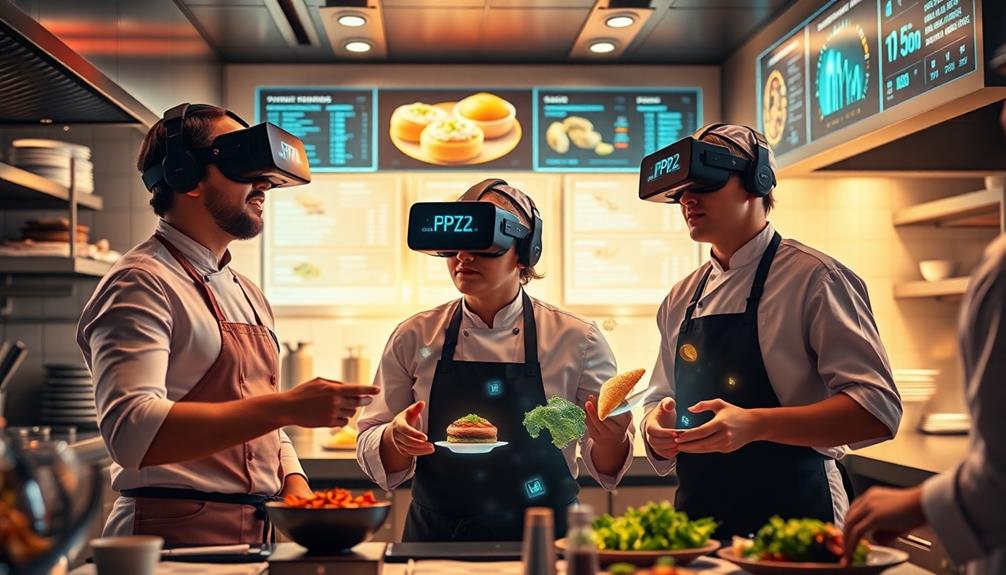
Revolutionizing training and operational efficiency, AR/VR technology is reshaping how restaurant staff develop their skills.
With VR training, you can immerse your employees in realistic customer service scenarios, drastically reducing training time while improving information retention. This risk-free environment boosts service quality, allowing staff to practice without the pressure of real customers.
By incorporating elements of classic American diner dishes like loaded baked potatoes, employees can also learn about menu items while honing their service skills.
AR tools play an essential role in maintaining food safety and quality control. By providing real-time monitoring, these tools guarantee compliance with health regulations, which is critical for any dining establishment.
Additionally, AR enhances inventory management by offering visual cues that streamline operations and minimize order errors.
Gamification elements in AR/VR training foster a competitive atmosphere that keeps your staff engaged, ultimately increasing staff retention rates.
When employees enjoy their training, they're more likely to stay and contribute to a consistent service quality.
Personalized Marketing Strategies
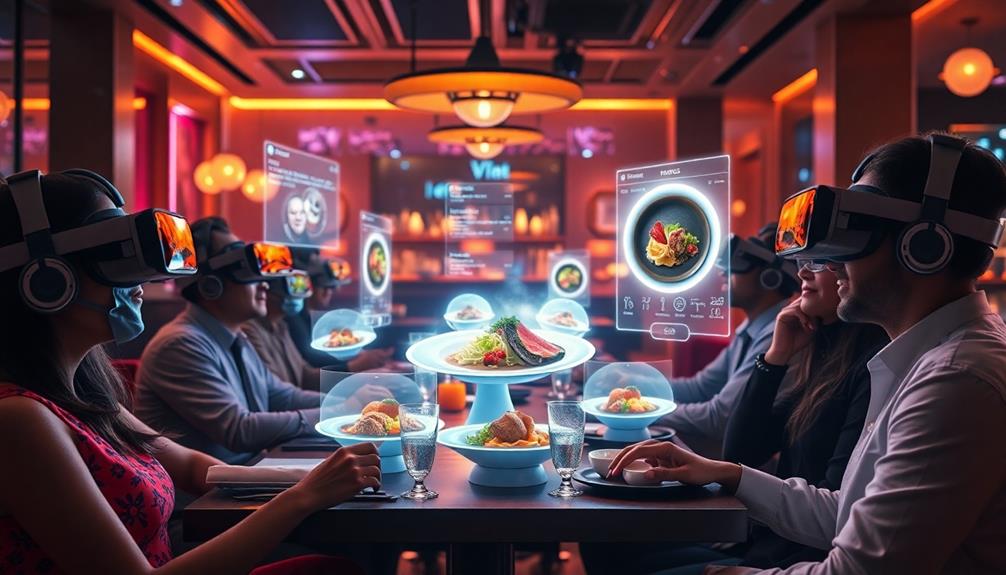
With the operational efficiencies gained through AR/VR training, restaurants can now focus on enhancing customer engagement through personalized marketing strategies. By leveraging AR applications, you can access exclusive content tailored to individual dietary preferences, fostering a deeper connection with your brand.
Here's a glimpse of how various strategies can enhance customer engagement:
| Strategy | Benefits | Tools |
|---|---|---|
| Personalized Marketing | Builds brand loyalty | AR Applications |
| Immersive Advertising | Attracts consumer attention | VR Experiences |
| Gamification | Incorporates fun elements | Interactive Games |
| Social Media Integration | Boosts engagement rates | AR on Social Media |
These immersive advertising campaigns create unique experiences that resonate with your target audience, increasing brand visibility. Incorporating gamification during meals makes dining more enjoyable, leading to higher satisfaction levels. Additionally, personalized promotions delivered through AR can cater directly to individual needs, enhancing customer loyalty. Overall, these interactive experiences not only elevate the dining experience but also encourage sharing and word-of-mouth marketing, driving further customer engagement.
Future Trends in VR Dining
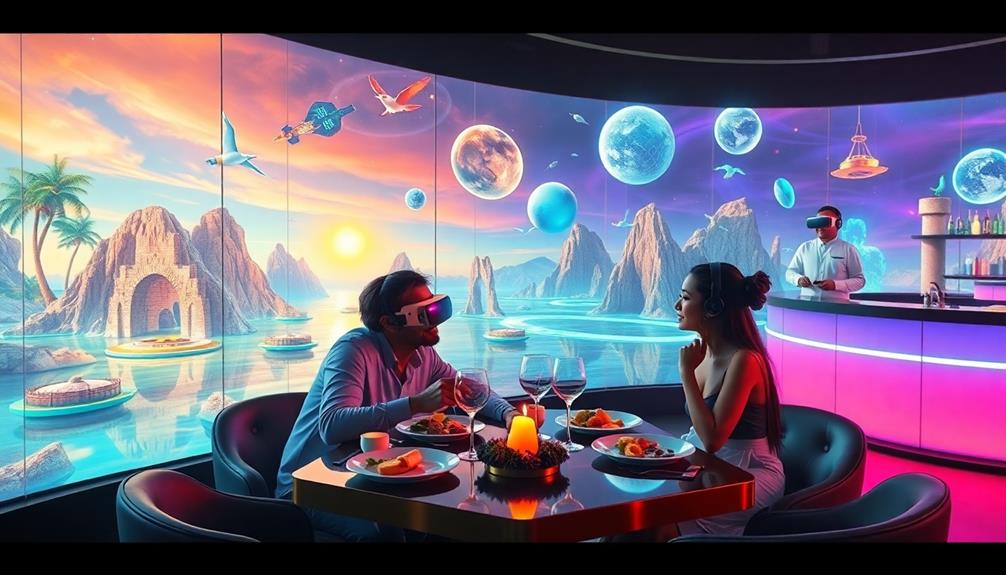
The future of VR dining is set to transform the way you experience meals, blending digital and physical culinary worlds. As immersive technologies evolve, you'll find that virtual reality (VR) and augmented reality (AR) are revolutionizing dining experiences.
Major brands like McDonald's and Coca-Cola are already engaging customers in innovative ways, showcasing how they utilize the metaverse to enhance customer engagement. With Brazilian cuisine's rich and diverse flavors, incorporating dishes like Caldeirada can create an even more engaging virtual dining experience, allowing you to explore the cultural nuances of each meal.
In the coming years, expect fully immersive dining experiences that engage all your senses. With concepts like Aerobanquets RMX, you'll taste real food in digitally enriched environments, pushing the boundaries of sensory engagement.
Companies such as Alarina Project will provide 360-degree virtual restaurant tours, allowing you to explore various dining establishments before you even step foot inside. This innovation won't only save you time but also enhance your decision-making process.
Additionally, personalized recommendations will become the norm, tailoring your dining choices to your unique preferences. With the global restaurant industry projected to exceed USD 10.45 billion by 2030, these future trends in VR dining will redefine how you enjoy meals, making each experience more engaging and memorable.
Frequently Asked Questions
What Is Virtual Reality Dining Experience?
A virtual reality dining experience immerses you in a digital environment while you enjoy your meal. You interact with fantastical settings and engaging elements, enhancing your appreciation for food through a unique, immersive atmosphere.
How Does VR Improve Customer Experience?
VR improves your dining experience by immersing you in enchanting environments, enhancing engagement through interactive storytelling, and allowing you to preview ambiance and menu options, making your meal more enjoyable and memorable than traditional dining.
How Does Virtual Reality Affect Consumer Behavior?
Virtual reality affects your consumer behavior by immersing you in engaging environments, increasing your emotional connection to products. You're more likely to share experiences and make informed choices, boosting your overall satisfaction and brand loyalty.
What Are the Positive and Negative Effects of Virtual Reality?
Did you know 70% of VR users report improved skills? While virtual reality can enhance experiences and engagement, it can also create high costs and risk losing authentic interactions, making it a double-edged sword in various fields.
Conclusion
As you step into the future of dining, imagine savoring your favorite meal in a breathtaking virtual landscape. The impact of virtual reality isn't just a fleeting trend; it's reshaping how you experience food, enhancing every bite with unforgettable surroundings. With personalized marketing strategies and efficient operations, the possibilities are endless. So, as you ponder your next dining adventure, ask yourself: are you ready to embrace the extraordinary world of VR and elevate your taste buds like never before?







